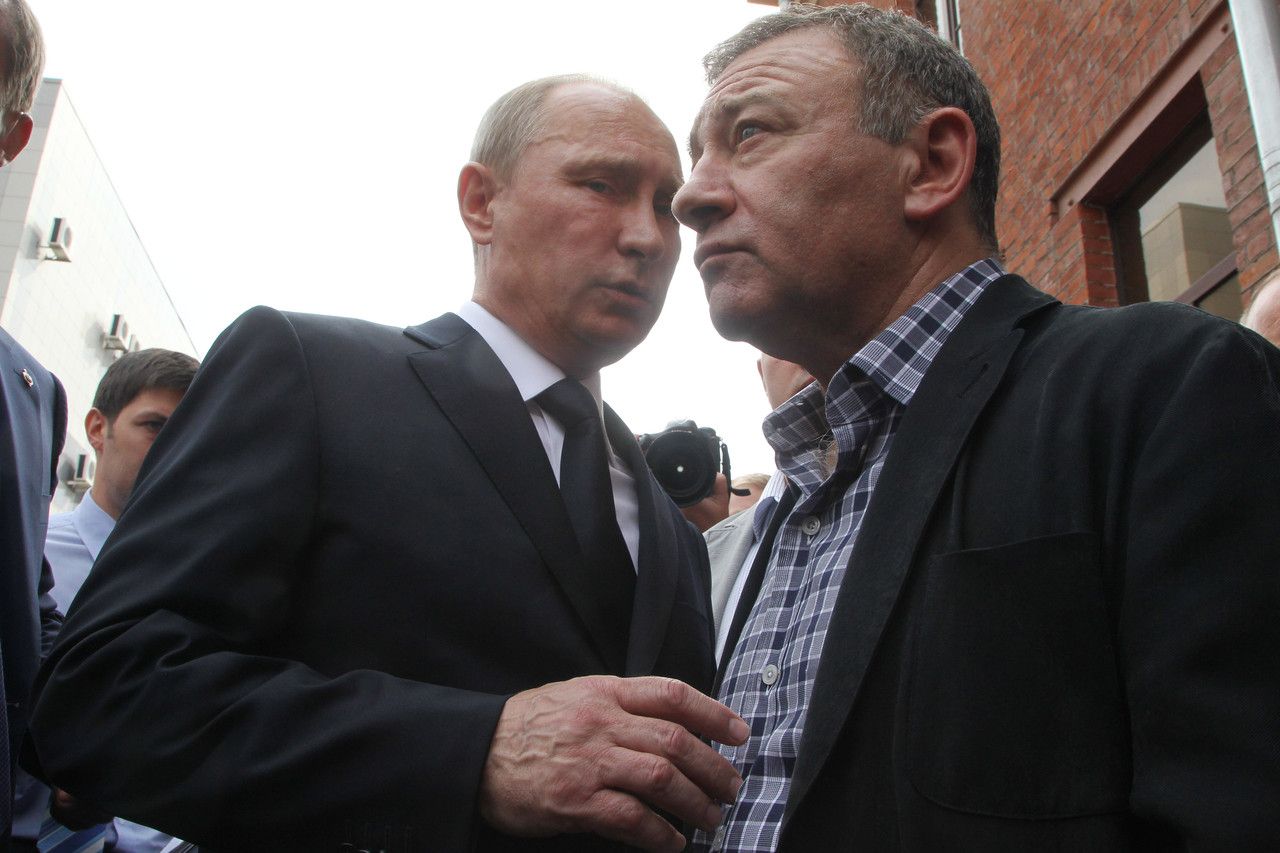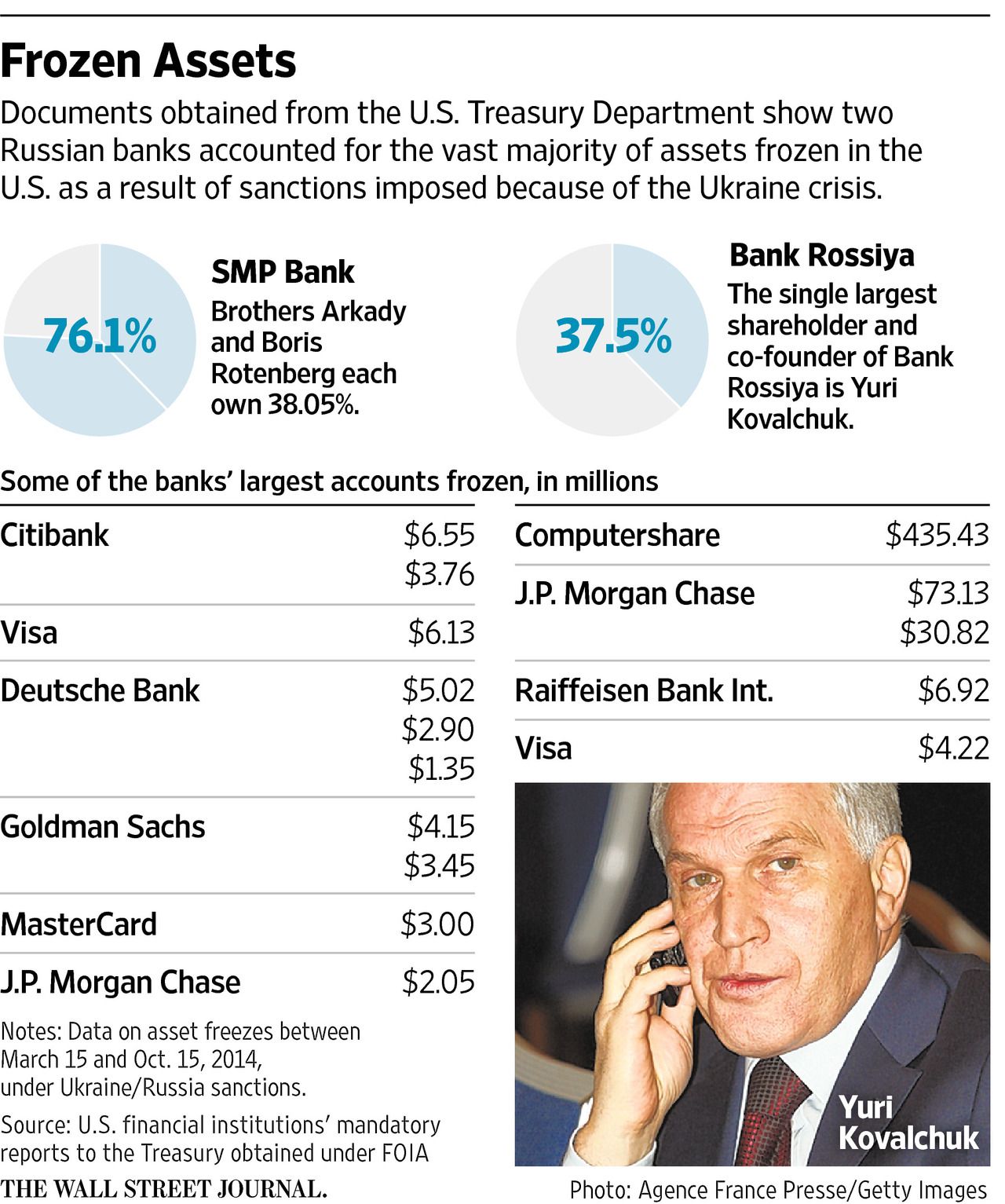 Russian President Vladimir Putin, left, and billionaire Arkady Rotenberg attend the funeral of a former judo trainer in St. Petersburg in 2013. PHOTO: GETTY IMAGESBanks controlled by three billionaire friends of Russian President Vladimir Putin have seen about $640 million of assets frozen in the U.S. as retaliation for the Kremlin’s actions in Ukraine, according to U.S. government records.
Russian President Vladimir Putin, left, and billionaire Arkady Rotenberg attend the funeral of a former judo trainer in St. Petersburg in 2013. PHOTO: GETTY IMAGESBanks controlled by three billionaire friends of Russian President Vladimir Putin have seen about $640 million of assets frozen in the U.S. as retaliation for the Kremlin’s actions in Ukraine, according to U.S. government records.
The figures, not previously reported, show the surprising extent to which the economic sanctions imposed by the U.S. have pinched the pockets of some of Russia’s most politically connected firms.
Hit the hardest is Bank Rossiya, which had at least $572 million blocked in U.S. accounts, according to records released to The Wall Street Journal by the Treasury Department. That is equivalent to roughly 10% of its 2013 assets, at today’s exchange rate.
The St. Petersburg bank, whose founder Yuri Kovalchuk is alleged by the U.S. to be one of Mr. Putin’s “cashiers,” was described by the Obama administration as a personal bank for senior Russian officials.
Also hit is SMP Bank, majority-owned by Arkady and Boris Rotenberg, two brothers who are childhood friends and former judo partners of Mr. Putin. They have amassed some of Russia’s biggest fortunes, built in part on lucrative contracts with the state and state-owned companies.
 Their bank has had at least $65 million—equal to about 2% of 2013 assets—blocked across dozens of accounts in U.S. financial institutions, Treasury documents show.
Their bank has had at least $65 million—equal to about 2% of 2013 assets—blocked across dozens of accounts in U.S. financial institutions, Treasury documents show.
Dozens of other Russian firms have been ensnared in U.S. sanctions, including a prominent weapons manufacturer. But none comes close to those amounts, reflecting the two banks’ exposure to Western money channels.
The figures also highlight the limited reach of such targeted sanctions—at least relative to the immense fortunes amassed by Russian oligarchs.
The Obama administration and the European Union have imposed several rounds of sanctions since the conflict in Ukraine began. Some mandated visa restrictions and the freezing of individual or company assets, while others sought to restrict Russian access to Western financing or technology.
The idea was to penalize the Kremlin’s inner circle and increase the pressure on Mr. Putin to change course. Yet, nearly a year after the Kremlin grabbed Crimea from Ukraine, there is no evidence the strategy has substantially affected Mr. Putin’s calculus.
Even as Western sanctions help push the Russian economy toward recession, Western officials say Moscow has continued to support and arm separatists in eastern Ukraine in a fight that has claimed some 6,000 lives.
Moscow says its annexation of Crimea reflected the will of the people, citing a vote held under occupation. It has denied aiding the rebels, and imposed its own countersanctions against individuals and some Western imports.
The U.S. and EU have warned of additional sanctions if a peace plan for Ukraine, reached last month, falls apart. There have been calls for more draconian sanctions, including cutting Russia off from the Western bank-transfer system.
But U.S. and European officials have indicated they aren’t seriously considering this option. Some Russian officials have said it would amount to an act of war.
$637
Amount the separatist Luhansk People’s Republic had frozen in its PayPal account, according to Treasury documents
More comprehensive restrictions on Russian business would be particularly sensitive in Europe, which relies on Russian energy imports. Washington has sought to coordinate closely with the EU because unilateral U.S. sanctions would lack the same impact.
Moscow maintains its annexation of Crimea reflected the will of the people living there. It has consistently denied aiding the rebels and imposed its own counter-sanctions against individuals as well as some Western imports.
Amid the renewed Cold War atmosphere, asset freezes targeting Mr. Putin’s longtime friends could contribute to even greater personal animosity.
Arkady Rotenberg had some real-estate holdings blocked in Italy last year, in what appears to be the only publicly disclosed instance of property frozen under the EU sanctions. Mr. Rotenberg acknowledged the problem in a recent interview with the Russian news agency Interfax, calling the freeze “an administrative arrest.”
The Russian parliament is considering a bill, dubbed the Rotenberg law, that would compensate Russian companies and individuals for assets frozen in the West. Mr. Rotenberg, whose net worth Forbes this year estimated at $1.4 billion, says he had nothing to do with the bill and needs no state subsidies.
Some Kremlin-connected oligarchs have minimized their exposure to Western financial markets, in possible anticipation of sanctions.
For instance, Gennady Timchenko, another billionaire friend of Mr. Putin, sold his long-held stake in major oil trader Gunvor just a day before he landed on the U.S. sanctions list in March 2014.
The Treasury Department released the documents after a request made by the Journal under the Freedom of Information Act, but wouldn’t comment further.
Bank Rossiya declined to comment. Mr. Putin has always denied any personal financial connection to the bank, but after the sanctions were imposed he announced that in solidarity, his government salary would henceforth be deposited there.
In a rare interview with Russian state television last year, Mr. Kovalchuk, the bank’s largest shareholder, dismissed the U.S. sanctions as immaterial for the bank or his own finances.
He also called on Russian businesses to become more patriotic and minimize their exposure to the West. “People understand, intuitively, on which side of the barricades business stands,” he said.
At the time, Bank Rossiya had $435,433,344 sitting in a single U.S. account with a financial firm called Computershare Inc., according to the Treasury. Computershare declined to comment. The company says on its website that it manages dividend payments and shareholdings on behalf of its clients.
In 2013, Bank Rossiya reported total assets of 338 billion rubles, which is about $5.6 billion at today’s exchange rates. The assets frozen include accounts held by Sobinbank, a wholly owned subsidiary.
The nature of Bank Rossiya’s U.S. assets in Computershare and elsewhere couldn’t be determined.
“It would appear that Computershare administers investments held by Bank Rossiya outside of Russia,” said Lee Wolosky, a former White House official and a sanctions expert now with Boeis, Schiller & Flexner law firm.
The dollar figure on the account could reflect the market value of securities, which might be harder to sell in a hurry, Mr. Wolosky said.
It’s unclear whether Bank Rossiya attempted to wind down its Western holdings. The bank’s second-largest blocked account in the U.S., worth $73,132,260, was with J.P. Morgan Chase .
J.P. Morgan, which declined to comment, served as the U.S. correspondent bank for Bank Rossiya as well as SMP Bank.
Igor Iliukhin, an SMP spokesman, said assets frozen in the U.S. are “inessential” and that sanctions have only a “slight impact” on the bank’s activity. He said the blocked assets are “much less” than the $65 million figure contained in Treasury reports, but declined to elaborate.
SMP Bank had total assets of about 170 billion rubles in 2013, which is roughly $2.8 billion at current exchange rates.
Unlike Bank Rossiya, SMP Bank didn’t have most of its U.S. assets in a single account, but maintained hundreds of accounts at major financial institutions. Its biggest account was with Citibank N.A., holding $6.4 million. SMP also had millions sitting at Deutsche Bank , MasterCard and others. The banks declined to comment.
In announcing sanctions against the Rotenbergs, Treasury said the brothers received some $7 billion in contracts for Sochi Olympics. Boris Nemtsov, the prominent Putin critic who was killed in Moscow last week, had detailed the Rotenbergs’ alleged no-bid contracts in Sochi in a 2013 report.
Arkady Rotenberg has denied he benefited financially from his connections with Mr. Putin.
“If we are talking about business, it is often harder for me than for my competitors,” he told Russia’s Interfax news agency in October. As for SMP Bank, Mr. Rotenberg said it “didn’t suffer much” from sanctions because most of its business is in Russia.
Besides the banks, Russian firms with significant cash tied up in the U.S. banking system include weapons maker KBP Instrument Design Bureau, with nearly $10 million frozen in four accounts at Citibank, Treasury documents show. Citibank again declined to comment.
KBP makes and exports antitank weapons, air-defense systems and mortars, among other armaments. It referred questions to its holding company where a spokeswoman wasn’t available for comment Thursday. It is unclear why KBP, which had been sanctioned even before Ukraine for alleged dealings with Iran, would even risk keeping any assets in the U.S.
Because of privacy laws, Treasury redacts the names of sanctioned individuals whose assets have been frozen, although it identifies institutions. There aren’t many such individual accounts, and the largest single individual account has $2 million, at Brown Brothers Harriman. The bank declined to comment.
There are mildly comical instances too: East Ukraine’s separatist Donetsk and Luhansk People’s Republics set up PayPal accounts holding $5,354 and $637, respectively, according to the Treasury documents. The accounts were apparently registered under the militias’ real names. PayPal froze them. The company declined to comment.
Source: wsj.com
 В Атырау -10
В Атырау -10